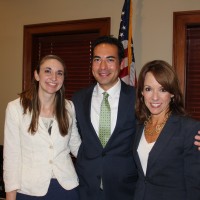
Investigative Reporters Explain Methods, Ethics Of Reporting Most Difficult, Controversial Stories
Four Baton Rouge reporters and editors explained the details of investigative journalism to members of the Chamber of Commerce of East Baton Rouge Parish at Café Américain.
And they had some advice for those who might someday be the target of their investigation.
Speakers were Chris Nakamoto of WBRZ-TV, Andrea Gallo of The Advocate, Stephanie Riegel, editor of The Business Report, and Woody Jenkins, editor of the Capital City News and Central City News.
Gallo discussed the ethics of investigative journalism, saying that her newspaper forbids reporters from violating any law in reporting a story. They must also be upfront with someone they are interviewing. “You can’t talk to someone for 30 minutes and then say, Oh, by the way, this is for a story! You have to tell them at the beginning that you are a reporter,” she said.
Nakamoto said the subject of an investigation should always be willing to speak to the reporter. It is always better to get your side of the story on the record, he said.
Riegel discussed the difference in reporting on public officials vs. reporting on business leaders. Public officials are held to a higher standard, she said, because they hold a special public trust.
Jenkins told funny stories about his experiences in journalism, including one about when Buckskin Bill was trying to get Baton Rouge to build a zoo. His newspaper at the time, the North Baton Rouge Journal, included a misprint on the top of the front page. Instead of saying “Baton Rouge Nees a Zoo,” the headline said, “Baton Rouge Needs Zoc”. He and his staff spent 24 hours blackening in the C and making it into an O on 10,000 copies of the paper.


 August 17, 2017
August 17, 2017 







No comments yet... Be the first to leave a reply!